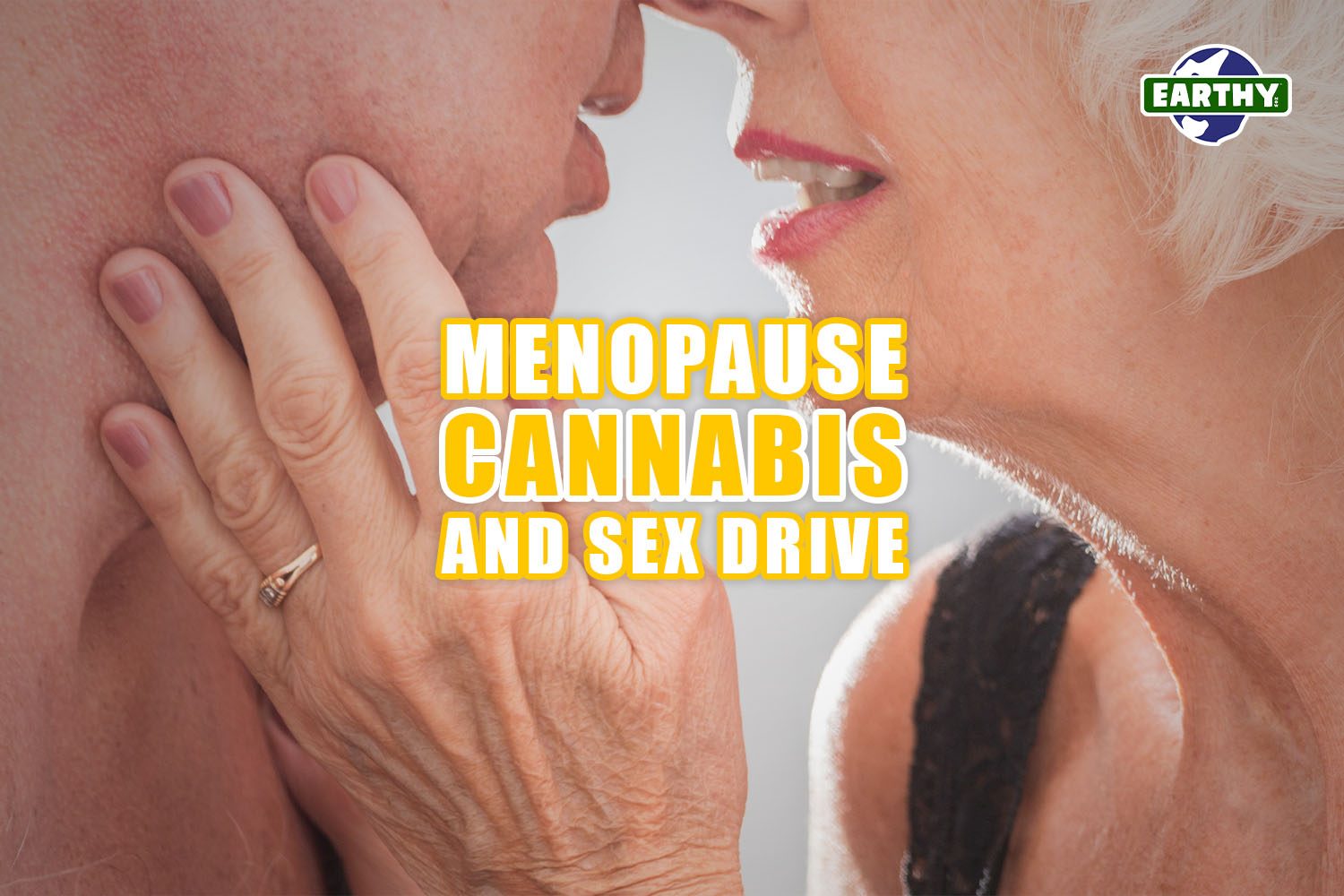During menopause, many women experience hot flashes, night sweats, mood swings, brain fog, sleep problems and vaginal dryness. All of these symptoms impact a woman’s overall well-being and sexual health. Needless to say, it can be daunting to navigate these symptoms.
Menopause is a natural stage of a woman’s life that marks the end of her reproductive years. Typically, it hits between the ages of 45 and 55. This significant transition brings about hormonal changes in the body, resulting in a range of physical and emotional symptoms. We’ll explore how cannabis may affect women’s well being during these years.
Can cannabis help during menopause?
Female sexual dysfunction, including low libido and decreased sexual desire, is a common experience of menopause that can significantly impact a woman’s sex life and relationships. There has been growing interest in the potential use of cannabis as a tool for menopause-related symptoms [1]. Though more research is needed, anecdotal reports point to a promising future.
Medical cannabis refers to the use of the cannabis plant or its chemical compounds, such as cannabinoids, for medicinal purposes, usually under the supervision of a healthcare professional. Here we’ll look at the connection between menopause and cannabis, and explore the current research regarding this complex topic.
The impact of menopause on female sexual function
During menopause, the production of sex hormones, including estrogen and progesterone, drops. These hormones play crucial roles in maintaining the health and function of the reproductive system. For example, a decline in estrogen levels can lead to vaginal dryness, discomfort during intercourse and decreased sexual desire. In addition these issues, menopause can cause other physical and emotional symptoms. Many women experience hot flashes, night sweats, mood swings and sleep problems. These impact a woman’s sexual health and overall well-being [2].
Female sexual dysfunction is a complex issue with multiple factors. Hormonal changes, physical discomfort and psychological factors such as stress and anxiety all play a part. Even some medications used to manage menopause symptoms may have side effects that exacerbate the problems. Thus, many women seek alternative treatments [2].
Cannabis and female sexual function: what the research shows
The potential use of cannabis for managing menopause-related symptoms has recently gained attention due to the presence of cannabinoids. Cannabinoids are chemical compounds found in cannabis plants. Tetrahydrocannabinol (THC), cannabidiol (CBD), and other cannabinoids interact with the body’s endocannabinoid system (ECS). The ECS regulates various physiological processes.
Research regarding the impact of cannabis on female sexual function during menopause is still limited, and the findings are mixed. Yet, some animal and human studies have suggested that cannabis may have a role [3].
A study published in the Journal of Sexual Medicine in 2019 investigated the relationship between cannabis use and female sexual function in women [4]. To learn about cannabis and men’s health, read: Can Cannabis Increase Sex Drive in Men?
The 2018 Farm Bill and cannabis legality: understanding federal compliance
In December 2018, the United States Congress passed the Agriculture Improvement Act of 2018, commonly known as the 2018 Farm Bill. This legislation had significant implications for the legality of cannabis, specifically hemp, and its derivative compounds, cannabidiol (CBD) and delta-9 tetrahydrocannabinol (THC).
The 2018 Farm Bill marked a milestone in the evolving landscape of cannabis policy in the United States, paving the way for the cultivation, production, and sale of hemp and CBD products. Thanks to this bill, consumers may legally obtain products with cannabinoids like CBD and even low doses of THC [5]. Let’s look at the details of the 2018 Farm Bill, its context, and its impact on cannabis legality.
The historical context of hemp legality
To understand the significance of the 2018 Farm Bill, it’s essential to grasp the historical context of cannabis policy in the United States. The Controlled Substances Act (CSA) of 1970 classified cannabis as a Schedule I controlled substance alongside drugs such as heroin and LSD. This meant that the government deemed cannabis illegal at the federal level [6].
Over the years, cannabis stakeholders have made various efforts to reform cannabis policy, with the growing recognition of its potential medical and economic benefits. In 2014 congress passed the Agricultural Act of 2014, also known as the 2014 Farm Bill, which allowed hemp cultivation for research purposes. However, congress continued to restrict the production and sale of hemp-derived products until 2018 [7].
The 2018 Farm Bill’s impact
The 2018 Farm Bill significantly changed cannabis policy. The bill differentiated hemp from marijuana under the CSA, effectively legalizing hemp cultivation and production at the federal level. The federal government now defines hemp as cannabis that contains 0.3 percent Delta-9 THC or less. Delta-9 THC is the psychoactive compound that produces the “high” associated with marijuana [6].
This change in the legal status of hemp opened up new opportunities for farmers, manufacturers, and consumers. It allowed for the large-scale cultivation of hemp for various purposes, including fiber, grain, and CBD production. Farmers across the United States began to embrace hemp as a viable agricultural crop, with many states implementing hemp pilot programs to regulate its cultivation.
The Farm Bill and beneficial cannabinoids
Furthermore, the 2018 Farm Bill clarified that hemp-derived products—like CBD—are not considered controlled substances. This opened the door for producing and selling a wide array of hemp products. Hemp quickly gained popularity for its beneficial properties. For instance, CBD and low THC products, ranging from oils and topicals to edibles and beverages, flooded the market.
Cannabinoids that may help with sex-related menopause symptoms
Though scientific research is scarce, cannabinoids such as THC and CBD show promise. These cannabinoids may become helpful because they interact uniquely with the body’s endocannabinoid system [8].
On a related note, cannabis may act as an aphrodisiac more generally, helping people achieve deeper relaxation, greater comfort and connection.
Love Potion #9: Delta-9 THC and Sex Drive
The endocannabinoid system (ECS)
Sexual health is a crucial aspect of human well-being. Recent research shows that the endocannabinoid system (ECS) may be involved. The ECS is a complex mammalian cell-signaling system. It involves many physiological processes. Understanding how the ECS might influence sexual function provides insights [10].
The ECS comprises three main components: endocannabinoids, receptors and enzymes. Endocannabinoids are naturally occurring compounds structurally similar to the cannabinoids found in cannabis. The ECS’s receptors are proteins found on the surface of cells. They interact with endocannabinoids (made by the body) and phytocannabinoids (made by plants) to transmit signals.
Two major types of receptors, CB1 and CB2 receptors, exist in various tissues and organs throughout the body, including the reproductive system. Finally, enzymes break down endocannabinoids after they have fulfilled their function, primarily to establish homeostasis.
The ECS and sexual function
Research shows that the ECS modulates functions by interacting with the neurotransmitters and hormones [11].
Dysregulation has been implicated as something to be aware of. For example, an imbalance of endocannabinoid levels or malfunction of receptors may contribute to abnormal activity [12]. However, more research is needed to understand the ECS’s role in sexual function fully.
Best Edibles for Female Arousal

The ECS, menopause, cannabis and sex drive
The potential implications of cannabis are encouraging. Cannabinoids such as THC and CBD show promise for their beneficial effects [13]. However, more research is needed to fully understand the complexities of the ECS and its interactions with the reproductive system, including during menopause.
The bottom line about cannabis and menopause
Though cannabis seems to work well for some, it’s not for everyone. That said, there are few side effects related to cannabis use. Looking for a good CBD product for a beginner? Try CBD Daily Gummies for daily cannabinoid benefits.
A Beginner’s Guide to CD and Sex Drive
Medical Disclaimer / Legal Disclaimer – Information is provided for educational purposes. It does not and is not intended to constitute legal or medical advice. We attempt to be accurate and up-to-date, but the legality of cannabinoids and the science of cannabis are evolving. The author is neither a legal professional nor a medical expert. Before buying or using any products, you should check with your local authorities and medical providers.
References
- Does Cannabis Help with Menopause Symptoms?
- Cannabis and Menopause
- Effects of Cannabinoids on Sexual Function
- Effects of Marijuana Use on Sexual Function in Women
- Hemp Production and the 2018 Farm Bill
- The Schedule 1 Status of Marijuana
- The 2014 Farm Bill-What Does it Mean?
- A Survey of Medical Cannabis Use
- Are Women Turning to Cannabis for Menopause Symptom Relief?
- The Endocannabinoid System: Essential and Mysterious
- Circulating Endocannabinoid Concentrations and Sexual Arousal in Women
- Neurobiological Interactions Between Stress and the Endocannabinoid System
- Cannabis May Offer Relief from Menopause Symptoms
- Marijuana Associated with Hormonal Changes in Men





